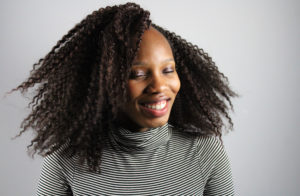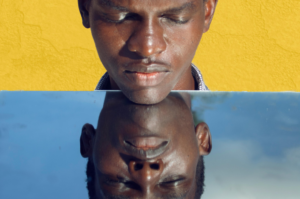Ijeoma sat on the on the toilet seat with the dripping pregnancy test enclosed in her palm. She stared at it, willing the results to change. After an unreasonably long time in the small bathroom, she stood up and walked to the sink where she looked at herself in the mirror.
She had just turned 30, her caramel skin and cheeks still indifferent to her age. She had full lips that throbbed, the kind that white women paid an unreasonable amount of money to acquire, the same lips she had been teased about in school. Her classmates had compared them to the rubbery cow skin that was used in cooking soup. “Pomo lips” they called them. Her thick black hair stood in sprouts, growing nowhere but up. She took one last look at herself and walked into the bedroom.
She took the pregnancy test towards the bed. Nnamdi sat on the edge of it, his glasses resting on his nose as he peered at the glaring screen of the Ipad.
“I’m pregnant.” She said, wielding the damp stick towards him as proof. He looked up from the screen; his face contoured like he was being disturbed.
Fraught with irritation, he replied “Are you sure?” in the same voice he used on his kids when he asked if their rooms were clean for the umpteenth time.
“Yes, other than the results of the pregnancy test, I haven’t seen my period in a while. Plus, I’ve been feeling queasy these past few weeks.”
She listed her symptoms like a lawyer making her case. She had missed her last two periods, but the queasiness she threw in there for effect. She was pregnant, and she was sure of it. She hated him for making her feel small. He took his thin-framed glasses off his face and rubbed his eyes. She stared at him willing him to say something.
“Okay, we’ll take care of it,” he said. She stood there, waiting for him to reveal his plan to her, but when he turned his attention back to his screen. So she grabbed her car keys off the nightstand and murmured something about going to Wal-Mart.
She drove her blue Toyota Prius out of their driveway. It was another day in late September, and the trees were heavy with russet leaves. They lived in a townhouse in Chestnut Hill, Philadelphia, a neighborhood inhabited by recently retired couples. Nnamdi said it was a good place for them to start their lives.
As she pulled into the Wal-Mart, she reached in the backseat of her car for her purse but only scuffed her hand on another copy of her Fundamentals of Nursing textbook. Like their garage, her car was home to numerous editions and versions of books she bought after she was accepted to Gwynedd Mercy University two years before. Two years after Nnamdi asked her to defer her admission so that she could have more time to acclimate to life in the U.S, the hardcover textbooks now sport a permanent coat of dust and are only used by Nnamdi to prop doors open and start the grill in the summer.
She parked her car in the parking lot and went inside the store. She walked in determined to buy something from each aisle. She had decided that she would go home, make some dinner and have a civilized conversation with Nnamdi. They were both adults, and this was their baby.
***
She met Nnamdi at the Akanu Ibiam airport five years ago. She had flown into Enugu to visit her older sister. As she stood by the airport’s only conveyor belt awaiting her luggage, she saw him. His purple shirt gleamed against his cognac colored skin, his mouth wide open in laughter as the baggage porter jokingly harassed him for money.
“Oga, you go do Christmas for us now.”
He nodded his head in agreement and patted the porter on his back. He looked like a man that worked out but not like those men she saw on the wrestling shows her nephews made her watch. He looked sturdy and reliable, like the horse you would bet on at the track or the car you would buy at the sale because you knew it would get you where you needed to go.
The sound of the truck carrying the luggage from the flight jolted her. It was at that moment she saw him staring at her too. Unsure about what to do, she walked towards the belt and asked a porter to help unload her luggage from the truck.
“Na the blue one. Papa, be careful oh, make you no break anything we dey inside.”
The porter was an old man, one she was familiar with from her many trips to and from the airport. She didn’t know his real name and had never bothered to find out so she called him Papa.
As she stood there waiting for her bag to be unloaded, she saw him walking over from the corner of her eye. His hand tightly clutching a Blackberry, and his strides long and hurried, like he was walking to catch up to a moving car.
When Nnamdi approached her, she got a clearer view of his face. His bespectacled eyes were small and drooping behind the glasses and his lips were thick and slightly chapped; the dryness of the weather responsible for the thin white shadow that lined his mouth.
“Hello, my name is Nnamdi. What’s yours?” he asked.
His introduction was direct and was full of the unspoken assumption that this was something they had been waiting to happen since they spotted each other across the room.
“It’s Ijeoma,” she responded careful not to betray her excitement.
“Ee-joo-mah,” he repeated. “I hope your trip went well?” He asked. She laughed and said yes.
They exchanged numbers, and he promised to call when he got a chance.
He called the next day, the day after that, and every day that she was in Enugu. He was a business school graduate from the University of Pennsylvania. He ran a hedge fund company in South Africa and traveled between both countries. It turned out that he was only in town to visit his aging mother.
She liked him. His money was unassuming, and he waxed poetic about John Coltrane and James Baldwin. She had dated men, but none like him. The men she met at the University of Lagos were either older men who never got out of their cars to approach her, instead sending their drivers or university students with whom nights of passion always left her annoyed and regretful as she lay in the darkness of their mosquito-infested room.
He was new to her, and like a new dress, she found every opportunity to wear him. They saw each other every day during his trip, and after he left, they exchanged long winded email messages detailing how they had each spent their day. It was in one of these email exchanges that Ijeoma found out Nnamdi had two children, sons that he took swimming on the weekends, sons with whom he practiced soccer, sons that he had with a woman who used to be his wife. Ijeoma could picture them, loose-limbed boys with skin as brown as Nnamdi’s.
“They’re 7 and 8,” he said to her over the phone.
“Excuse me, miss? Do you need a cart? The Wal-Mart attendant asked as she tried to reach for a loaf of whole grain bread with avocados and mangoes nestled in the crook of her arm.
“Yes, please,” she said, slightly embarrassed. She threw the items into the cart, wiped the sweat off her face and made her way to the frozen food aisle. While inspecting the sliced turkey, she let the cold air caress her face.
“We were married for a little over ten years, but I don’t think we ever wanted the same things,” he said over the phone.
A week after she found out about Nnamdi’s children, Caleb and Emmanuel, she struggled between wanting to know everything about Nnamdi and nothing at all.
“How old were you when you got married?”
“28.”
“How did you meet her?”
“Her cousin was a friend of mine.”
“What is your relationship like now?”
“We live together and co-parent, but we aren’t married.”
Her name was Rita. She was fair skinned, pear shaped, and petite. In the picture Ijeoma found of her on Nnamdi’s Facebook page, she wore a yellow and red ankara headscarf that framed her perfectly shaped head. Her lips were lined with a maroon colored lipstick, and her pearly teeth shone bright.
She looked like one of the women Ijeoma saw on the cooking shows that advertised knorr and maggi cubes—women carefully dressed in traditional attire modest enough to make them look approachable but expensive enough to imply their status. Their makeup carefully applied and suspiciously intact after the preparation of a hearty soup. To Ijeoma, they promoted what she believed was an unattainable and grossly unrealistic level of perfection. Unlike them, Ijeoma still smudged her eyeliner by accident and unevenly applied foundation on her acne covered skin.
Nnamdi hated sweets. Other than the occasional bar of dark chocolate, she didn’t buy candy, cake or ice cream until Caleb and Emmanuel came to visit. The boys spent the entire summer with Ijeoma and Nnamdi and returned to their mother in South Africa to continue school. She remembers how Caleb would saunter in after playing soccer, his shoulders hunched and the back of his neck unusually dark from the glare of the sun. With stained soccer cleats and a jersey drenched in sweat, he would walk past her as she chopped vegetables on the kitchen island and head straight to the fridge. Gatorade in hand, he would walk out of the kitchen as wordlessly as he walked into it, the same way his father did.
Emmanuel’s arrivals were much noisier. He was slightly chubbier than his brother, and the sound of his heavy breathing was a telltale sign that he wasn’t far behind. He would march into the kitchen, skin ruddy and hands dirty, looking for something to eat.
“Do you need help with anything, aunty?” he always asked.
“No, my dear. Go and take a shower and come down for dinner.”
She threw a few bars of milk chocolate into the cart for good measure; who knew what this baby was going to do to her appetite?
They met at a canteen six months after their initial meeting at the airport. She was in between lectures, and he was in Lagos for business, so she asked him to meet her at a local restaurant on the outskirts of her campus. It was midday, and the place was empty. As Nnamdi spoke, she stared down at the red and black plastic carpet and tried to process the words coming out of his mouth.
“I want you to come with me,” he said.
“I’ll make a killing from the company buyout. I can move out of SA like I’ve always wanted to, and we can be together. UPenn has a nursing program, and you can stop fooling around here. Ijeoma, don’t you understand what this means?”
She didn’t understand, but she knew that she was supposed to. His gaze on her made it hard for her to breathe, and the red and black carpet began to look distorted. When she finally looked up and met his eyes, she nodded her head in approval, and he smiled.
Ijeoma pushed her cart towards the checkout line. It was piled high with fruit, bread, tea, and other condiments that she couldn’t imagine her and Nnamdi needing. As the cashier scanned the products and placed them in gray plastic bags, she imagined sitting across from Nnamdi in their dining room, the only thing between a wooden bowl of plastic fruit.
She would make ofe nsala, the translucent soap that always seemed to warm Nnamdi up. She would make sure to include the kind of fish he liked, and she would boil some yam so he could cut it up, place it inside the soup and wait until it absorbed just enough broth for the yam to fall apart in his mouth. After that, she would open up a bottle of wine. They had not celebrated anything in a long time, so she had many unopened bottles to choose from. He would take his glass, and she would sit with him in the living room, and she would explain why this baby was a blessing for the both of them.
“Nnamdi, don’t you understand what this means?” she would implore.
He would smile and nod. He would even kiss her stomach and tell her how excited he was that she was pregnant. She walked into the evening, pushing the cart towards her car. The air was warm, but the wind was stagnant, and the clouds rose signaling impending rainfall. As she put the bags from the grocery store into the trunk of her Prius, she thought about the conversation she was going to have with Nnamdi, and she knew that it would go well.
She closed the trunk, pushed the cart back to the rack of other carts and walked back into her car. She started it and began to drive.
**********
About the Author:
 Ashley Okwuosa is a 2015 graduate of Rutgers University with a B.A in Journalism and Women’s Studies, she is an aspiring fiction writer and writes about bad/good TV and other things on talkingheadblog.wordpress.com.
Ashley Okwuosa is a 2015 graduate of Rutgers University with a B.A in Journalism and Women’s Studies, she is an aspiring fiction writer and writes about bad/good TV and other things on talkingheadblog.wordpress.com.










Adeleke David August 16, 2016 00:04
I enjoyed this.